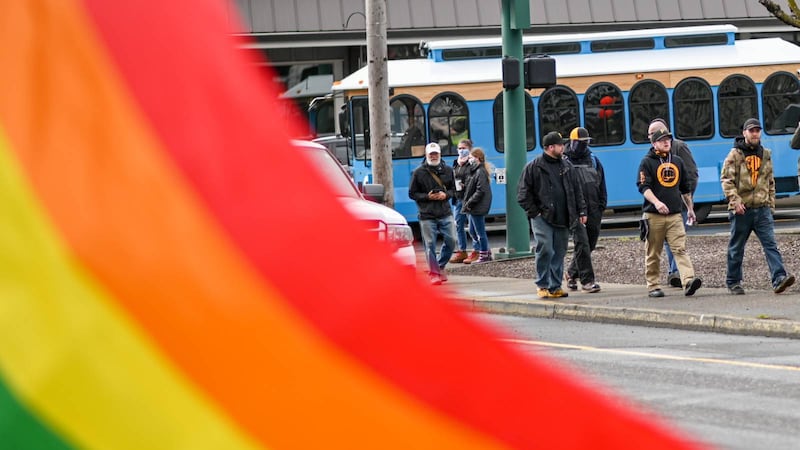Two forms of pride were on display Saturday on opposite sides of Pioneer Boulevard in Sandy.
On the north side of the city's main street: a Pentecostal church rally "to celebrate the natural heterosexual family," ringed by the distinctive yellow collars of the Proud Boys. On the south sidewalk: the town's LGBTQ community, gathered with rainbow flags and face masks for a parking-lot party dubbed "Have a Gay Day!"
The March 20 events were noteworthy because they marked the first Oregon appearance of the Proud Boys, a far-right men's fraternity, since the storming of the U.S. Capitol on Jan. 6.
But the rainy afternoon also showcased the cultural tensions in Sandy, the Clackamas County gateway to Mount Hood skiing that for much of the past year has defined itself in opposition to Portland values—from closing restaurants to prevent COVID spread to toppling statues in racial justice protests. Saturday's events, while peaceful, suggested Sandy, like many places in Oregon, is still arguing over what its own values will be.
That debate took a form that Portlanders will recognize: dueling rallies. Antagonistic protests have become a staple of Oregon politics over the past several years, sometimes devolving into brawls. The Sandy events remained entirely peaceful.

Pastor Russell Collier of the Rivers of Living Water United Pentecostal Church has been holding rallies in Sandy's Centennial Plaza every month this year.
In a public Facebook post advertising the March 20 rally, Collier described the event as a celebration of the natural heterosexual family, a stance against abortions, and a flag wave to celebrate First Amendment freedoms. "Why? The natural heterosexual family is the design of God for mankind and it is under attack spiritually, politically & socially," he wrote.
Holding an American flag and wearing a hooded sweatshirt emblazoned with the words "Living Faith in Jesus," he preached exactly that to his small congregation, and a contingent of a dozen Proud Boys who gathered on Centennial Plaza on that rainy day.

On the other side of the road, in a parking lot along a city park, about 100 people gathered to support Sandy's LBGTQ residents. Allison, an organizer of the "Have a Gay Day" event who did not want to disclose her last name, tells WW that news of Pastor Collier's events caused a lot of pain in Sandy. "The purpose of this event isn't a counterprotest. We want to positively and safely channel our energy by centering the rural community's LGBTQ voices."
The LGBTQ event featured appearances and speeches by student leaders of Sandy High School, and ethnic musical performances by local Indigenous communities. Vendors set up booths to provide rainbow-colored masks, hand sanitizers, and food for attendees.
Andrew Schaffer, a Sandy High School teacher, came to support his students in the event by taking photographs for them. "I was in drama when I went to high school, and many of my friends did not feel comfortable coming out," he says, "and when I returned to Sandy High School a decade later, there were posters welcoming students from all races and sexual orientations. That is something that wouldn't have been OK back then."

Like many attending the event, Schaffer acknowledged the leaps in social progress made in recent years but felt that it was not yet enough—especially in the rural communities of Oregon, as evidenced by the rally being held across the street.
Though the two events were not in view of one another, members from both sides stood on opposing sidewalks of Pioneer Boulevard, one of the two main thoroughfares that run through downtown Sandy.
"We don't care who you fuck! The problem is, y'all are commies!" a Proud Boy yelled, flashing the "OK" hand gesture, which the Proud Boys know their adversaries consider a sign of white supremacy. The two sides hurled insults across the road under the watch of Sandy police officers.
The arrival of the Proud Boys added a menacing element to what otherwise might have felt like a Saturday farmers market or other small-town event.
The Proud Boys are a group of self-described "Western chauvinists" who have been known to engage in violence against their political opposition in previous demonstrations, often brawling with left-wing or anti-fascist protesters on the streets of Portland and Salem during rallies since 2017.

Collier denied inviting the Proud Boys to his rally, but said they decided to attend themselves, and he appreciated their presence given the threats he said he'd received online as a result of planning this event. Collier said pro-LGBT banners were hung up on his church after a "We Are Still America" rally he held in January. That led him to believe that property damage to his church was a real possibility.
"I appreciate them standing for their First Amendment freedoms," Collier says.
Attendees of the LGBT event also voiced fears of violence occurring during and after the event. Sandy High students organized carpool rides to make sure everyone got home safe.
"This is for the LGBT people still in Sandy, to those who have left, and those in other rural communities," said Allison, the rally organizer, in a closing speech. "We love you for your whole selves."
